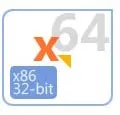When to Go X64
Sometimes it is hard to tell wether to work in 32-bit or 64-bit world. Here are some hints.
Hyper-V
This one is easiest. To use Hyper-V you must use x64 windows. End of story.
Windows XP
This was first consumer choice of 64-bit operating system and as such it had some problems. You can argue that most (if not all) problems were caused by lousy drivers, but fact remains that there were problems. Later drivers fixed this situation, but I would not recommend this version to anyone.
Vista / Server 2008
Here situation depends mostly on memory. It is easy if you have more than 4 GB of memory (e.g. 6 GB). You must use 64-bit windows to use all that memory. There is choice of using 32-bit Windows Server with PAE which then enables usage of more memory, but I would not recommend it since performance cost for that memory is too high.
Here I must say that 64-bit drivers are really stable now. Device manufacturers really learned their lesson with Windows XP x64 and now everything works as it should. There can be some issues with finding proper and signed driver (driver signing is requirement) for older devices, but for newly bought devices everything just works.
When you have just 4 GB of memory there is slight dilemma. 32-bit windows will see less than 3.5 GB (even with /3GB switch). Rest of memory will be simply unavailable. However, in 64-bit world pointers are bigger (eight bytes instead of four) so all that additional memory is just used for larger pointers. Useful memory (used for data) is roughly the same.
Here I would go with 64-bit Windows (if all drivers are available). You will have no advantages now but if you add more memory to your computer, there is no need to reinstall anything. Also, from developer perspective, you can track those pointer bugs (e.g. .NET interop calls) more easily since most of them are there because someone decided to put pointer (64-bit value) in integer (which is 32-bit value even on 64-bit system).
When there is less than 4 GB, memory is just wasted if you go 64-bit.
